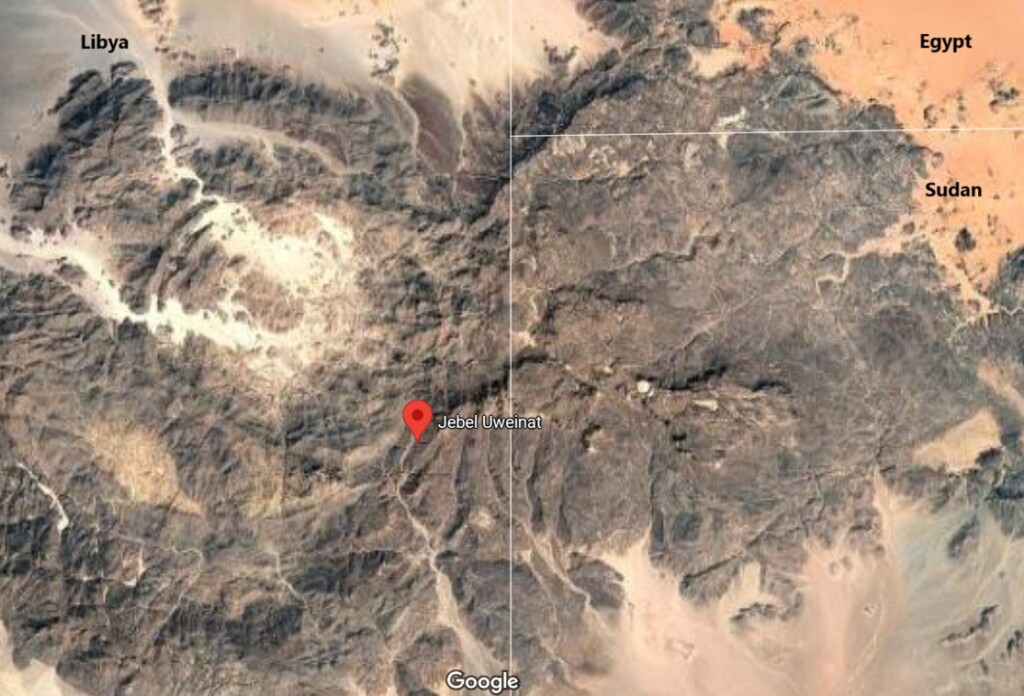SAF evacuates ‘strategic’ Sudan-Libya-Egypt border triangle following RSF takeover

The El Uweinat mountain range at the Sudanese-Egyptian-Libyan border triangle (Source: Google maps)
The paramilitary Rapid Support Forces (RSF) announced yesterday it seized control of the strategic El Uweinat area, at the border triangle connecting Sudan, Libya, and Egypt. The Sudanese Armed Forces (SAF) confirmed it had evacuated the area, framing the move as a defensive redeployment while accusing the RSF of invading with direct support from Khalifa Haftar’s Libyan National Army and the United Arab Emirates (UAE).
In a statement on Telegram yesterday, the RSF described the capture as “a qualitative step that will have repercussions along several combat fronts, particularly in the northern desert”. The paramilitary group claimed the victory —which they said was “welcomed by spontaneous mass celebrations” by locals — would help combat “illegal immigration and human trafficking“, adding that the region’s location is a hub for trade and reflects “the cultural diversity and social interdependence of the region’s peoples”.
Jebel Uweinat (Mount Uweinat) is a mountain range extending over 1,500 square kilometres divided between Sudan (Northern State), Egypt (New Valley), and Libya (Kufra). About 60 percent of the area lies in Libya. Studies say that Jebel Uweinat contains the second largest gold reserve in Africa.
In a statement disseminated online, the Ministry of Foreign Affairs (MoFA) said that the RSF, backed by “the Libyan forces of Khalifa Haftar (the Salafist battalion)”, had “invaded” the border points. The SAF confirmed in a separate statement that it evacuated the triangle as part of “defensive arrangements to repel the aggression”.
The SAF and MoFA condemned the alleged intervention as “a blatant aggression against Sudan” and an extension of an “international and regional conspiracy … supported by the United Arab Emirates and its militias in the region”.
Sudan’s National Security and Defence Council, chaired by SAF Commander Lt Gen Abdelfattah El Burhan, held an emergency meeting yesterday. A brief statement after the meeting noted that the council addressed security developments but did not disclose specific outcomes.
In a post on X, OSINT researcher Rich Ted said he observed an increase in cargo flights from the UAE to Kufra Airport in Libya, near the border triangle. Satellite imagery reportedly confirmed the presence of three IL-76TD cargo planes at the airport on May 21 and 31, and at least five cargo aircraft there on Tuesday.

Reactions
Libyan authorities on both sides of the country’s political divide swiftly denied the accusations. The General Command of the Libyan Arab Armed Forces, loyal to Khalifa Haftar, dismissed the claims as “false allegations” and “a rehashed narrative.” In a statement, it called the accusations a “blatant attempt to export Sudan’s internal crisis”, adding that its forces had recently been attacked by Sudanese patrols on the Libyan side of the border.
Separately, the Tripoli-based Government of National Unity, led by Abdelhamid Dbeiba, stated that the Libyan armed group implicated “is not under the authority of the Libyan Ministry of Defence and does not take orders from the General Staff of the Libyan Army”. Its Ministry of Foreign Affairs condemned any Libyan involvement in the Sudanese conflict.
The development was condemned by several Sudanese political groups, including the National Forces Coordination, and the Sudan Liberation Movement (SLM-MM) led by Minni Minawi. In contrast, the Sudan Foundation Alliance cautioned that the SAF’s accusations against regional countries “risked returning Sudan to the international isolation it experienced under the former regime”.
Former clashes in the area
The events on Wednesday follow recent violence in the same area. On Friday, clashes erupted between the Sudanese Joint Force* and the salafist Sabil El Salam battalion, a group affiliated with Haftar’s forces. According to Abdelrahman Hashim, a commander in the Sabil El Salam battalion, the fighting left two Sudanese soldiers killed and led to the capture of others, while three soldiers from his battalion were taken captive.
Radio Dabanga reported on June 8 that artisanal gold miners in the El Uweinat mountain range near the Egypt-Libya-Sudan tripoint had called on the Sudanese authorities to intervene after an Egyptian army unit attacked them ‘on Sudanese territory’.
*The Darfur Joint Force was formed in June 2022, as agreed on in the 2020 Juba Peace Agreement (JPA), to protect the people in the region. The force was made up of fighters of the Sudan Liberation Movement faction headed by Darfur Governor Minni Minawi (SLM-MM), the JEM faction led by Finance Minister Gibril Ibrahim (JEM-GI), and several small rebel groups that signed the JPA. These movements renounced their neutrality in November last year and are now fighting the RSF alongside the Sudanese army. Since then, Sudanese media speak about the Joint Force of Armed Struggle Movements, while the group’s logo on their X and Facebook accounts says Sudanese Joint Force (and in Arabic Sudanese Joint Forces).











 and then
and then